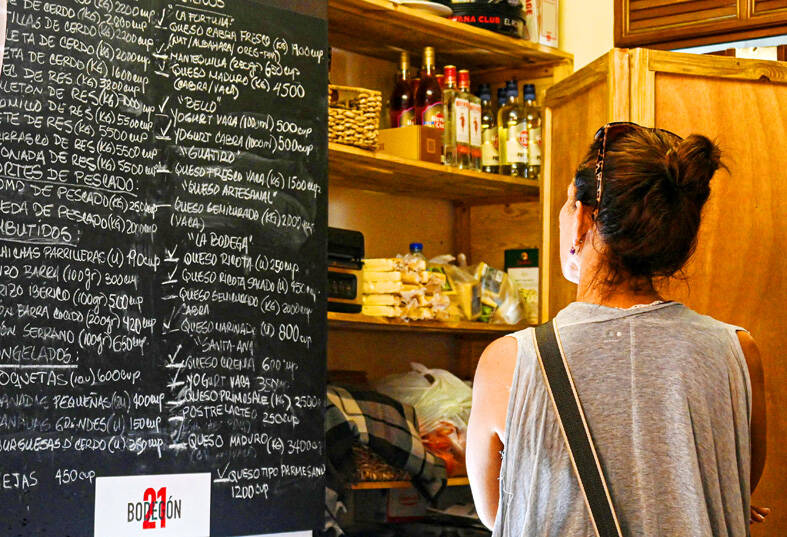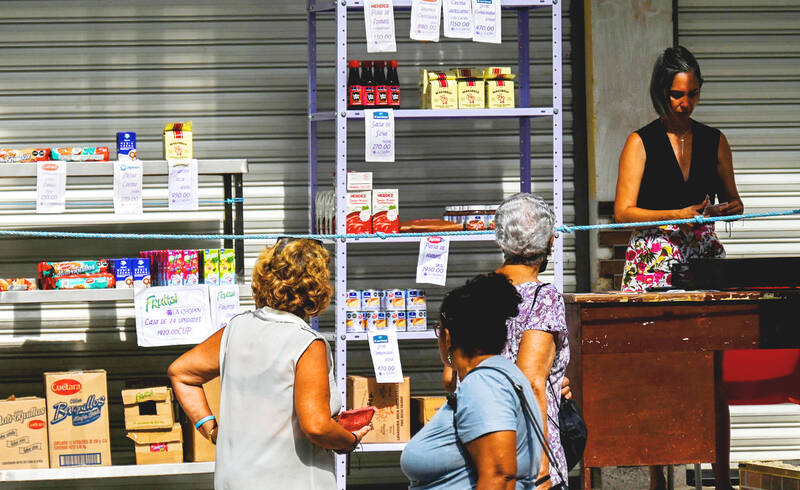Like mushrooms after the rain, small stores are springing up all over Havana, many run from homes or garages as the private sector finally gains a foothold in communist Cuba.
Small businesses, only authorized in 2021, are mounting a challenge to companies run by the one-party state which are emptier every day as Cuba battles a shortage of foreign currency and sky-high inflation amid its worst economic crisis in 30 years.
From garages, porches or small rented shops, Cubans sell anything from beer and sweets, meat, dairy and groceries that are becoming increasingly difficult to find elsewhere.

Photo: AFP
“If you need something you can’t find [in the state-run stores], they have it. They have the things you need,” Maria Leonor, 73, said as she emerged from one of the new private outlets.
After six decades of exclusively state-owned commerce, in August 2021 the government approved a law approving small and medium enterprises.
The sea change came as Cuba reeled from the aftereffects of the COVID-19 pandemic, which flattened its critical tourism industry, and the tightening of US sanctions.

Photo: AFP
At the neighborhood store El Bodegon 21, a colorful array of products are arranged prettily on wooden shelves — a stark contrast to the monotony of indistinguishable cans and empty refrigerators in gray-hued state shops.
For customers like Leonor, these new stores offer a chance to find products, like yogurt, missing from the official market.
An added benefit: Cubans can buy at the private stores with the local peso, while government stores require payment in foreign currency, which is hard to come by.
The downside is that prices are “quite high,” Leonor said.
A kilogram of milk powder sells in a small private store for about 2,000 pesos — just less than half the average monthly salary. Before, it was only available on the black market, long absent from government shops or the “bodegas,” outlets where Cubans have access to a limited selection of subsidized products through ration books.
In May last year, US President Joe Biden had pledged to “increase support for independent Cuban entrepreneurs” and help the private sector grow.
A year later, last month, hundreds of Cuban tradespeople sent the US leader a letter urging him to follow through on this promise.
They asked him for nonimmigrant visas to permit them to travel and acquire supplies, to allow access to payment platforms such as PayPal, the right to set up US bank accounts, and the reopening of US tourist travel to Cuba.
Omar Bouso, 27, is among those trying to make a living under the new rules that have given rise to some 7,800 private small and medium-sized enterprises in almost two years. He lost his work in a restaurant that closed during the pandemic, then opened a Hawaiian fast-food restaurant with two friends, which they run from a private home.
“We found a niche in the market to do something different,” he said.
Entrepreneurs such as Bouso get their goods from private import companies that did not exist until recently.
A UN report showed that about 22 percent of Cuban small enterprises are in construction, 19 percent in gastronomy and tourist accommodation, 12 percent in industrial food production and less than 3 percent in trade.
Inflation, which the government says could reach 39 percent this year, but analysts say would surpass 100 percent, hits the public and private sectors alike.
Cuban Minister of Economy and Planning Alejandro Gil recently sought to clear the government of blame for high prices. In a parliamentary session, he pointed the finger at the private sector.
“We are not expecting of anyone to work at a loss, but it is not possible to make a fivefold profit so fast,” he said.
Gil also defended state-owned companies, which he said “are not making a profit and pay minimum salaries so as not to increase prices to the population.”
The state sector continues to carry the economy and employ almost two-thirds of workers, a regional UN commission said.
Oniel Diaz, founder of private business consultancy Auge, said that many of Cuba’s problems can be addressed with responsible regulation, but added that the purpose of small business would always be to “generate wealth.”

Semiconductor business between Taiwan and the US is a “win-win” model for both sides given the high level of complementarity, the government said yesterday responding to tariff threats from US President Donald Trump. Home to the world’s largest contract chipmaker, Taiwan Semiconductor Manufacturing Co (TSMC, 台積電), Taiwan is a key link in the global technology supply chain for companies such as Apple Inc and Nvidia Corp. Trump said on Monday he plans to impose tariffs on imported chips, pharmaceuticals and steel in an effort to get the producers to make them in the US. “Taiwan and the US semiconductor and other technology industries

SMALL AND EFFICIENT: The Chinese AI app’s initial success has spurred worries in the US that its tech giants’ massive AI spending needs re-evaluation, a market strategist said Chinese artificial intelligence (AI) start-up DeepSeek’s (深度求索) eponymous AI assistant rocketed to the top of Apple Inc’s iPhone download charts, stirring doubts in Silicon Valley about the strength of the US’ technological dominance. The app’s underlying AI model is widely seen as competitive with OpenAI and Meta Platforms Inc’s latest. Its claim that it cost much less to train and develop triggered share moves across Asia’s supply chain. Chinese tech firms linked to DeepSeek, such as Iflytek Co (科大訊飛), surged yesterday, while chipmaking tool makers like Advantest Corp slumped on the potential threat to demand for Nvidia Corp’s AI accelerators. US stock

The US Federal Reserve is expected to announce a pause in rate cuts on Wednesday, as policymakers look to continue tackling inflation under close and vocal scrutiny from US President Donald Trump. The Fed cut its key lending rate by a full percentage point in the final four months of last year and indicated it would move more cautiously going forward amid an uptick in inflation away from its long-term target of 2 percent. “I think they will do nothing, and I think they should do nothing,” Federal Reserve Bank of St Louis former president Jim Bullard said. “I think the

SUBSIDIES: The nominee for commerce secretary indicated the Trump administration wants to put its stamp on the plan, but not unravel it entirely US President Donald Trump’s pick to lead the agency in charge of a US$52 billion semiconductor subsidy program declined to give it unqualified support, raising questions about the disbursement of funds to companies like Intel Corp and Taiwan Semiconductor Manufacturing Co (台積電). “I can’t say that I can honor something I haven’t read,” Howard Lutnick, Trump’s nominee for commerce secretary, said of the binding CHIPS and Science Act awards in a confirmation hearing on Wednesday. “To the extent monies have been disbursed, I would commit to rigorously enforcing documents that have been signed by those companies to make sure we get